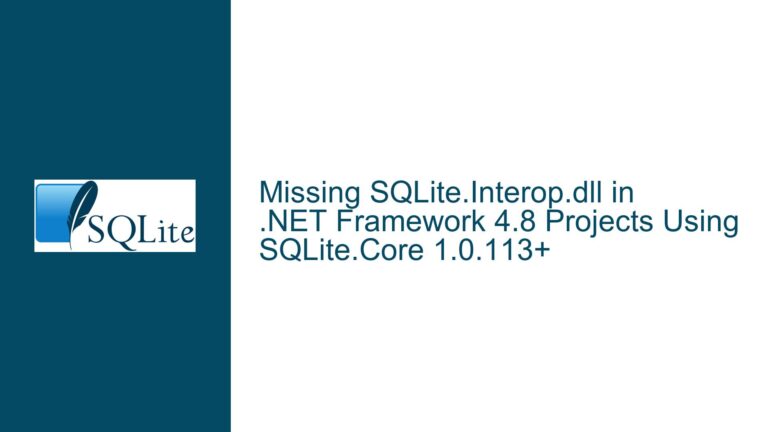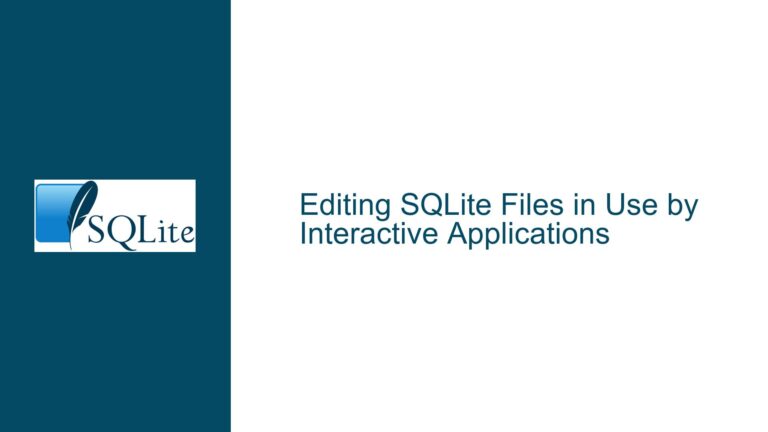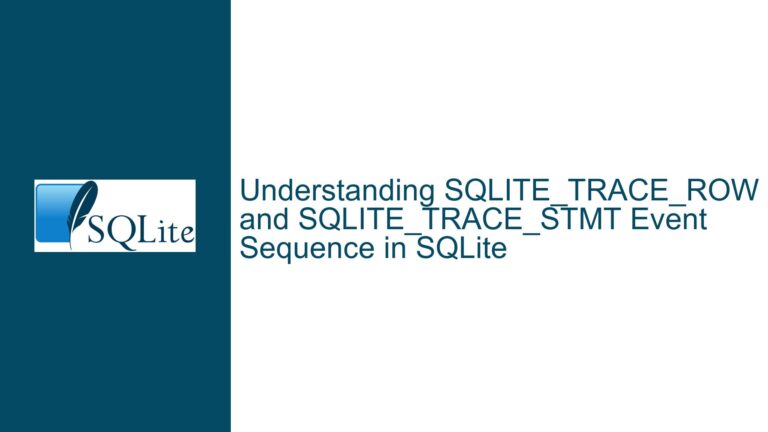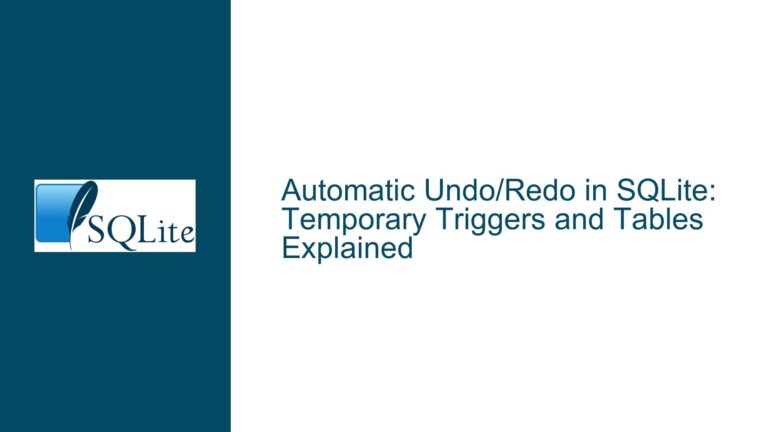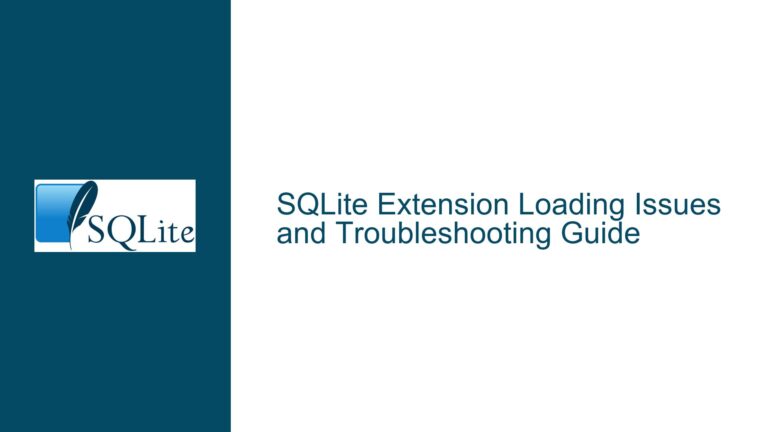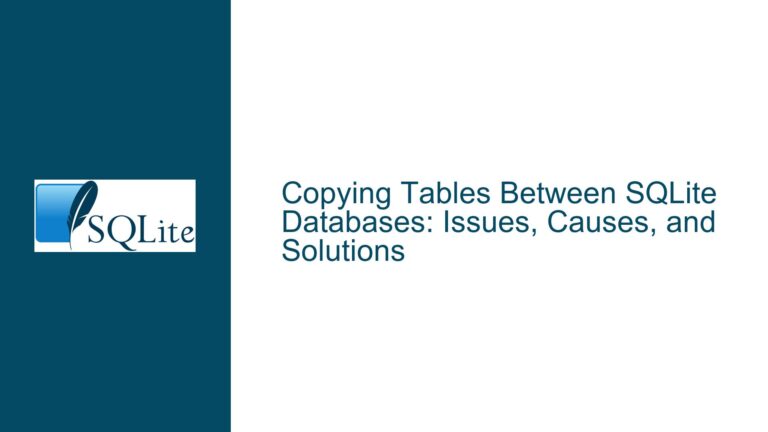Crash in sqlite3VtabModuleUnref Due to Premature DLL Unload After Extension Initialization Failure
Root Cause Analysis of Extension Initialization Failure and Module Destruction Race Condition
The core issue revolves around SQLite’s handling of extension modules during dynamic library (DLL/shared object) loading and unloading. When an extension’s initialization routine (sqlite3_extension_init) partially succeeds – creating at least one virtual table module but later failing – SQLite unloads the DLL before properly cleaning up the already-registered modules. This leads to a use-after-free scenario when the database connection attempts to call the module’s destructor (xDestroy) after the DLL has been unloaded, resulting in a crash.
The problem arises from the order of operations in sqlite3LoadExtension:
- The extension’s initialization function is called.
- Modules (virtual tables) are created, some with destructors (
xDestroy) pointing to code within the DLL. - If initialization fails (e.g., due to an error in creating subsequent modules), SQLite immediately unloads the DLL via
sqlite3OsDlClose(). - Later, during connection cleanup,
sqlite3VtabModuleUnref()attempts to callpMod->xDestroy(), which now points to unloaded code.
This sequence violates the assumption that all module destructors remain valid until explicitly deregistered. The premature unloading of the DLL creates a dangling function pointer, leading to undefined behavior.
Contributing Factors and Architectural Constraints
1. Lifecycle Mismatch Between Modules and Their Host DLL
SQLite extensions often register long-lived resources (modules, functions, collations) that depend on the DLL remaining loaded. However, sqlite3LoadExtension assumes that unloading the DLL immediately after initialization failure is safe, ignoring dependencies created during partial initialization. This violates the inversion of control principle: the extension DLL expects to manage its own resources via registered destructors, but SQLite unilaterally unloads the DLL before those destructors execute.
2. Lack of Resource Tracking During Extension Initialization
The sqlite3LoadExtension function does not track which resources (modules, functions, etc.) were successfully created during a failed initialization. Without this tracking, SQLite cannot perform targeted cleanup of only those resources created prior to the error. This leads to an all-or-nothing approach: either commit all resources or unload the entire DLL, risking dangling pointers.
3. Platform-Specific Behavior of Dynamic Library Unloading
As noted in the discussion, platform APIs like dlclose() (Unix) or FreeLibrary() (Windows) may not immediately unload library code. However, once SQLite calls these functions, the memory where xDestroy resided becomes invalid. This interacts poorly with:
- Static Destructors: C++ global objects or
__attribute__((destructor))functions that run duringdlclose(), potentially freeing resources the module destructor expects to use. - Threading: If other threads hold references to the DLL’s code or data, unloading can create race conditions.
4. Conflicting Error Handling Philosophies
The discussion highlights two competing approaches:
- Fail-Safe Cleanup: Unload the DLL to avoid resource leaks, risking crashes if cleanup code depends on the DLL.
- Fail-Silent Retention: Keep the DLL loaded to allow proper destructor execution, risking memory leaks if the destructors are faulty.
SQLite’s existing precedent (e.g., SQLITE_DBCONFIG_RESET_DATABASE bypassing virtual table destruction) suggests a bias toward avoiding crashes over perfect cleanup. However, extensions rely on documented behavior where destructors are called under normal circumstances.
Comprehensive Mitigation Strategies and Implementation Guidance
1. Deferred DLL Unloading with Reference Counting
Objective: Ensure the DLL remains loaded until all dependent resources (modules, functions) are destroyed.
Implementation Steps:
- Add a Reference Counter to
sqlite3Connection:
Track the number of extension-derived resources (modules, functions, collations) per connection.struct sqlite3 { // ... existing fields ... int nExtensionRefs; // Number of active extension resources void *pExtensionHandle; // DLL handle from sqlite3OsDlOpen() }; - Modify
sqlite3LoadExtension:
After successfulxInit(), associate the DLL handle with the connection instead of closing it immediately on error.// In sqlite3LoadExtension: if( rc!=SQLITE_OK ){ // Instead of closing the handle: db->pExtensionHandle = handle; // Increment refcount for each resource created db->nExtensionRefs += num_modules_created; } - Augment Resource Registration Functions:
IncrementnExtensionRefswhen modules/functions are added, decrement when destroyed.void sqlite3VtabCreateModule( sqlite3 *db, const char *zName, const sqlite3_module *pModule, void *pAux, void (*xDestroy)(void*) ){ // ... existing logic ... db->nExtensionRefs++; } - Delay DLL Unloading Until
nExtensionRefs==0:
Insqlite3VtabModuleUnref, decrement the counter and unload if needed:void sqlite3VtabModuleUnref(sqlite3 *db, Module *pMod){ // ... existing logic ... db->nExtensionRefs--; if( db->nExtensionRefs==0 && db->pExtensionHandle ){ sqlite3OsDlClose(db->pVfs, db->pExtensionHandle); db->pExtensionHandle = 0; } }
Tradeoffs:
- Pros: Matches DLL lifetime to resource dependencies.
- Cons: Requires pervasive changes to SQLite’s internal resource tracking.
2. Rollback Partial Initialization Before Unloading DLL
Objective: If xInit() fails, explicitly destroy all resources created during the failed initialization before unloading the DLL.
Implementation Steps:
- Track Newly Created Resources During
xInit():
Introduce a temporary list to record modules/functions added during extension load:typedef struct ExtensionLoadState ExtensionLoadState; struct ExtensionLoadState { Module *pModules; // Lists for functions, collations, etc. }; int sqlite3LoadExtension( sqlite3 *db, const char *zFile, const char *zProc, char **pzErrMsg ){ ExtensionLoadState state = {0}; // Pass state to registration functions rc = xInit(db, &zErrmsg, &sqlite3Apis, &state); if( rc!=SQLITE_OK ){ RollbackExtensionLoad(db, &state); sqlite3OsDlClose(pVfs, handle); } } - Modify Registration APIs to Use
ExtensionLoadState:int sqlite3_create_module_v2( sqlite3 *db, const char *zName, const sqlite3_module *pModule, void *pAux, void (*xDestroy)(void*), ExtensionLoadState *state ){ // ... existing code ... if( state ){ AddModuleToList(state, pNewModule); } } - Implement
RollbackExtensionLoad:
Explicitly call destructors for recorded resources:void RollbackExtensionLoad(sqlite3 *db, ExtensionLoadState *state){ Module *pMod; while( (pMod = state->pModules)!=0 ){ state->pModules = pMod->pNext; if( pMod->xDestroy ) pMod->xDestroy(pMod->pAux); sqlite3DbFree(db, pMod); } }
Tradeoffs:
- Pros: Cleanly unwinds partial initialization without changing DLL unloading logic.
- Cons: May not handle all resource types (e.g., VFSes, collations). Complex to implement due to SQLite’s decentralized resource management.
3. Document and Enforce Extension Initialization Best Practices
Objective: Shift responsibility to extension authors by formalizing constraints on sqlite3_extension_init.
Policy Changes:
- Mandate Atomic Initialization:
Extensions must either fully initialize (register all resources) or fail without side effects. - Prohibit Resource Registration After Failure:
Ifsqlite3_extension_initencounters an error, it must not register any modules/functions. - Provide Rollback Utilities in SQLite API:
Introduce new functions to facilitate atomic initialization:// Begin atomic extension initialization void *sqlite3_extension_begin(sqlite3 *db); // Commit all changes since begin int sqlite3_extension_commit(sqlite3 *db, void *token); // Rollback changes since begin void sqlite3_extension_rollback(sqlite3 *db, void *token);
Example Extension Usage:
int sqlite3_extension_init(sqlite3 *db, char **pzErrMsg, const sqlite3_api_routines *pApi){
void *token = sqlite3_extension_begin(db);
if( create_module1(db)!=SQLITE_OK ){
sqlite3_extension_rollback(db, token);
return SQLITE_ERROR;
}
if( create_module2(db)!=SQLITE_OK ){
sqlite3_extension_rollback(db, token);
return SQLITE_ERROR;
}
return sqlite3_extension_commit(db, token);
}
Tradeoffs:
- Pros: Shifts complexity to extensions, keeps SQLite core simple.
- Cons: Requires ecosystem-wide changes; existing buggy extensions remain problematic.
Decision Matrix and Recommended Path Forward
| Solution | Crash Risk | Leak Risk | Implementation Complexity | Ecosystem Impact |
|---|---|---|---|---|
| Deferred Unloading | Low | Low | High | Moderate (API changes) |
| Rollback Partial Init | Low | Low | Very High | Low |
| Documentation/Policy | Medium | Medium | Low | Very High |
Recommendation: Implement Deferred DLL Unloading (Solution 1) as it balances crash safety with reasonable implementation effort. Augment with documentation clarifying that extensions must not rely on destructors being called if dlclose() is a no-op on their platform.
Code Changes Required:
- Add
nExtensionRefsandpExtensionHandletostruct sqlite3: Requires version-controlled structure changes. - Modify
sqlite3VtabModuleUnrefand Similar Functions: Ensure reference counts are decremented on destruction. - Update
sqlite3OsDlCloseCalls: Replace immediate closure with conditional closure based onnExtensionRefs.
Testing Strategy:
- Crash Reproduction Test: Create an extension that registers two modules, where the second fails. Verify no crash occurs during shutdown.
- Leak Check: Use Valgrind or ASAN to confirm no handles are leaked when all references are removed.
- Cross-Platform Validation: Test on Windows (DLL), Linux (SO), and macOS (dylib) to ensure consistent behavior.
By adopting this approach, SQLite maintains its robustness guarantees while respecting extension resource lifecycles. Developers relying on existing extensions benefit immediately, and the changes remain transparent to well-behaved extensions.

